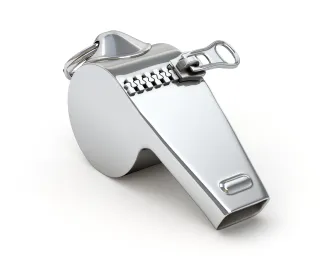In Raye v. Pan Am Rys., Inc., ARB Case No. 14-074, slip op. (U.S. Dep’t of Labor Sept. 8, 2016), the U.S. Department of Labor’s Administrative Review Board (“ARB”) clarified the standard for assessing punitive damages awards under the anti-retaliation provision of the Federal Rail Safety Act of 1982 (“FRSA”).
Punitive Damages in FRSA Whistleblower Retaliation Cases
-
An employer’s misconduct need not be egregious in order to trigger a punitive damages award under the FRSA; the employer’s state of mind is the focus of the administrative law judge’s (“ALJ”) inquiry.
-
It is at the ALJ’s discretion whether to award punitive damages in the interest of punishment and deterrence. Similarly, the amount of punitive damages necessary for punishment and deterrence is “a discretionary moral judgment” of the ALJ’s.
Background
Jason Raye (“Mr. Raye”) was working as a conductor for Pan Am Railways, Inc. (“Pan Am”). He reported safety concerns relating to some railroad ties to his manager, but Pan Am took no action to remedy the hazard. Three weeks later, as Mr. Raye descended from a boxcar onto those same railroad ties, he stumbled and sprained his left ankle. Pan Am charged and reprimanded Mr. Raye for violating a company rule that required Pan Am employees to be “assured of firm footing before they step down from a train.” Id. at 3. At the investigatory hearing, Mr. Raye testified that he had stumbled but not fallen when he sprained his ankle.
Following his reprimand, Mr. Raye filed a FRSA complaint with the Occupational Safety and Health Administration (“OSHA”), alleging retaliation by Pan Am for his reporting a safety hazard and an injury. Mr. Raye’s attorney drafted the complaint, which was “entirely consistent” with Mr. Raye’s stated account except in its claim that Mr. Raye “fell heavily to the ground.” Id. Pan Am, viewing the statement that Mr. Raye fell as a major discrepancy with his previous testimony, charged Mr. Raye with further rule violations including “providing false statements” and “act[s] of insubordination, hostility, or willful disregard of the Company’s interests”—violations that Pan Am deemed to be “sufficient cause for dismissal.” Id. (alteration in original). Mr. Raye then amended his FRSA complaint, alleging discrimination by Pan Am for his filing a FRSA complaint.
Ultimately, Pan Am took no disciplinary action because it found that the charges were unsustainable in light of Mr. Raye’s testimony that his attorney had written the “fell hard to the ground” language in his FRSA complaint, that he had not approved such language, and that such language was untrue. Pan Am stipulated to the ALJ that Mr. Raye engaged in FRSA-protected conduct in filing the complaint with OSHA and that Pan Am knew of that activity.
The ALJ found that Pan Am’s charging Mr. Raye with rule violations and subjecting him to a disciplinary hearing for the second time constituted an adverse action and was motivated by Mr. Raye’s protected activity. The ALJ also found that Pan Am failed to proffer an adequate affirmative defense. Therefore, the ALJ ordered Pan Am to pay damages and attorneys’ fees. Pan Am appealed, among other issues, whether the punitive damages award was proper.
Standard for FRSA Punitive Damages
Based on the foregoing, the ALJ awarded Mr. Raye FRSA’s maximum punitive damages award of $250,000 because, it concluded, Pan Am “intentionally violated” Mr. Raye’s FRSA-protected rights, and such an award was “necessary to deter similar conduct by Pan Am in the future.” Id. at 6. On review, the ARB was required to determine (1) whether punitive damages were warranted and (2) whether the amount of punitive damages awarded was proper. Id. at 8.
Punitive damages are proper where there has been “reckless or callous disregard for the plaintiff’s rights, as well intentional violations of federal law.” Id. (quoting Petersen v. Union Pac. R.R. Co., ARB Case No. 13-090, slip op. at 5 (U.S. Dep’t of Labor Nov. 20, 2014)). This inquiry focuses on the employer’s state of mind, and the ultimate determination is in the ALJ’s discretion. Id. at 8–9.
Here, the ALJ determined that Pan Am “consciously disregarded” Mr. Raye’s rights under the FRSA and “intentionally interfered” with his asserting those rights. Id. at 7. Pan Am’s charging Mr. Raye with rule violations after he filed his FRSA complaint constituted “an egregious, blatant, and willful act of retaliation.” Id. Therefore, the ALJ concluded that Pan Am’s conduct was “egregious” and so “of the sort that calls for deterrence and punishment.” Id.at 9.
The ARB concluded that the record substantially supported the ALJ’s finding of “egregious and intentional conduct” on the part of Pan Am. Id. at 8. In particular, the ALJ’s finding that Pan Am retaliated against Mr. Raye for “quintessential protected activity under the FRSA” indicated the egregious nature of Pan Am’s conduct. Id. at 8 n.32 (citing 49 U.S.C.A. § 20109(a)(l), (3), (4)).
The ARB reviews the amount of punitive damages awarded by an ALJ for abuse of discretion. Id. at 9. In determining the appropriate amount of punitive damages to award Mr. Raye, the ALJ applied a framework articulated by the U.S. Supreme Court in State Farm v. Campbell, 538 U.S. 408 (2003). Pursuant to this inquiry, the ALJ analyzed (1) how reprehensible or culpable Pan Am’s misconduct was; (2) how the potential penalty compared to the harm that Pan Am’s conduct caused Mr. Raye; and (3) the sanctions that have been imposed for similar misconduct.
On appeal, the ARB affirmed the ALJ’s award of punitive damages but stated that applying the State Farmguideposts was superfluous. Raye, slip op. at 9–10. Once an ALJ finds that a punitive damages award is appropriate, then it must determine “the amount necessary for punishment and deterrence,” which is “a discretionary moral judgment.” Id. at 10 (quoting Smith v. Wade, 461 U.S. 30, 52 (1983)).



 />i
/>i

